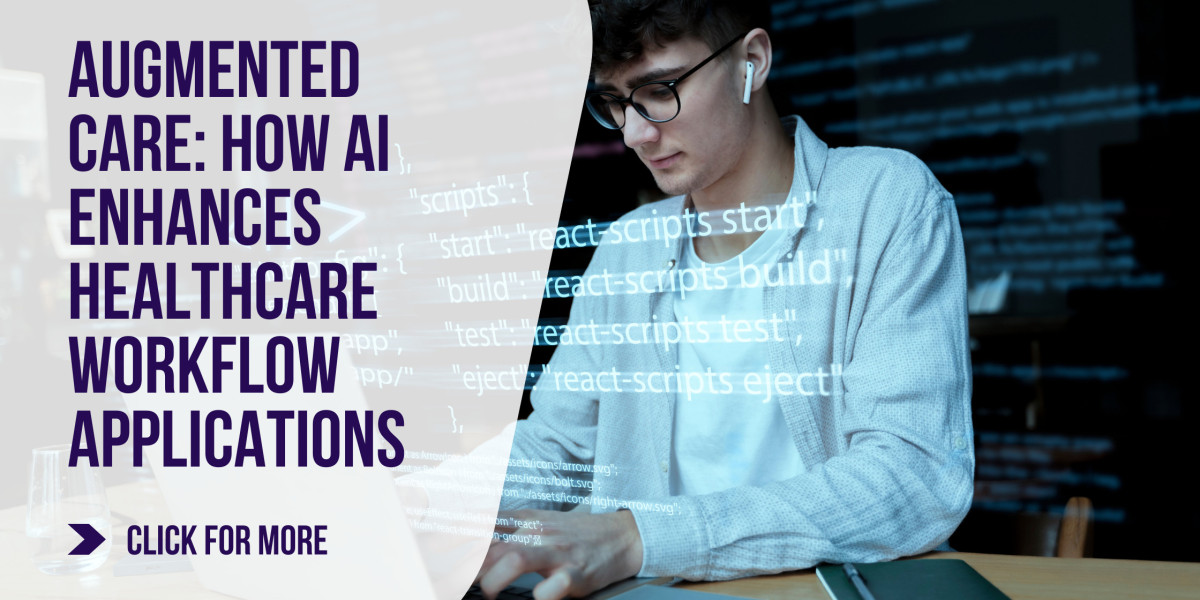Healthcare, by nature, is complex and fast-moving. Every second counts—from the moment a patient enters a clinic to the time a diagnosis is made and treatment begins. Yet, many healthcare facilities still wrestle with cumbersome workflows that slow down care delivery. Paper-based processes, siloed data, and communication gaps create bottlenecks that frustrate both providers and patients.
Enter AI-enhanced healthcare workflow applications. This is where technology stops being just a tool and starts acting like a smart partner. It augments the healthcare professional’s ability to manage tasks, process data, and make decisions—streamlining the entire care journey. The result? Faster, more accurate, and patient-focused care without adding stress to already overburdened staff.
In this blog, let’s unpack how AI is reshaping healthcare workflows, the tangible benefits it brings, and why it’s poised to become a non-negotiable part of healthcare software development globally.
The Healthcare Workflow Problem: Complexity Meets Urgency
Healthcare workflows involve a myriad of tasks: patient registration, clinical documentation, scheduling, billing, diagnostics, care coordination, and more. Often, these tasks are fragmented across multiple systems and departments.
Here’s the catch: delays or errors in any step can ripple through the entire process, causing inefficiencies or worse, impacting patient safety.
Historically, healthcare IT systems improved record keeping and digitized information, but they rarely reduced the cognitive and administrative burdens on staff. Providers still spend significant time on paperwork and manual follow-ups, diverting attention from patient care.
This reality sets the stage for AI’s entrance—not just as a nice-to-have but as a necessary evolution.
How AI Augments Healthcare Workflows
The phrase “augmented care” isn’t just marketing speak. It refers to AI’s ability to enhance human decision-making and operational efficiency in real-time. Here’s how AI-enabled workflow applications transform healthcare:
Intelligent Task Automation: Routine, repetitive tasks like appointment reminders, claims processing, or inventory management can be automated with AI, freeing staff to focus on patient interaction and complex decision-making.
Clinical Decision Support: AI algorithms analyze patient data to flag abnormal results, suggest diagnoses, or recommend treatment options—supporting clinicians without replacing their judgment.
Dynamic Scheduling: AI predicts no-shows or emergency cases and adjusts schedules proactively, maximizing resource use and reducing patient wait times.
Real-Time Data Integration: AI seamlessly aggregates data from multiple sources—EHRs, lab systems, imaging, wearable devices—providing a comprehensive patient view without manual cross-checking.
Workflow Optimization: By tracking how tasks flow through the system, AI identifies bottlenecks and suggests improvements, helping healthcare managers make informed operational decisions.
A Day in the Life: AI at Work in Healthcare
Picture this: a nurse logs into her workflow app at the start of her shift. Instantly, she sees a prioritized to-do list curated by AI, highlighting patients who need immediate attention based on their latest vitals and lab results. The system has already scheduled diagnostic tests for some and sent reminders for medication adherence for others.
Meanwhile, the physician receives AI-generated alerts about unusual trends in patient data, prompting a timely review that leads to early intervention. Behind the scenes, the billing department sees claims automatically flagged for potential errors, speeding up reimbursements.
This is not fantasy—it’s happening today in leading institutions. The common thread is AI’s ability to streamline workflows without overwhelming users with unnecessary information.
Real Benefits Beyond Efficiency
Yes, AI-driven workflow applications save time. But the true impact goes deeper:
Improved Patient Safety: By reducing manual errors and providing decision support, AI helps catch potential complications early.
Enhanced Provider Satisfaction: Automating mundane tasks and reducing cognitive overload improve job satisfaction and reduce burnout.
Better Resource Utilization: Intelligent scheduling and inventory management ensure staff and equipment are used optimally.
Patient Engagement: Streamlined workflows translate into shorter wait times and more face-to-face care, improving patient experience.
Data-Driven Insights: Continuous workflow monitoring allows organizations to adapt and evolve care delivery based on real-world evidence.
Challenges and How to Navigate Them
Integrating AI into healthcare workflows isn’t plug-and-play. Several hurdles remain:
Data Quality and Integration: AI’s effectiveness depends on clean, comprehensive data. Fragmented systems and inconsistent data standards can limit AI performance.
User Acceptance: Healthcare professionals may resist new systems if they disrupt familiar routines or seem like “black boxes” with unclear reasoning.
Regulatory Compliance: AI applications must comply with healthcare regulations around data privacy, security, and clinical validation.
Cost and Infrastructure: Implementing AI solutions requires investment in technology and staff training, which can be barriers for smaller providers.
Successful adoption requires transparent communication, involving end-users early in design, and choosing scalable, interoperable solutions.
Global Perspectives: AI Workflows in Diverse Settings
AI-augmented workflows aren’t limited to cutting-edge hospitals in major cities. They have enormous potential in under-resourced healthcare settings worldwide.
In remote clinics, AI can triage patients, suggest diagnostics, and optimize scarce resources, empowering frontline workers. Mobile-based AI workflow apps provide flexibility and access where infrastructure is limited.
This democratization of intelligent workflow tools supports universal health coverage goals by extending quality care beyond traditional boundaries.
Looking Ahead: The Future of AI in Healthcare Workflow Applications
AI in healthcare workflows is evolving rapidly. We can expect:
Greater Personalization: AI will tailor workflows not only to roles but to individual providers’ habits and preferences.
Predictive Analytics: Workflows will anticipate patient needs days or weeks in advance, improving preventive care.
Collaborative AI: Systems will facilitate team-based care by coordinating workflows across disciplines seamlessly.
Explainable AI: Increasing transparency in AI recommendations will build trust and ensure clinical accountability.
These trends will further integrate AI into the fabric of healthcare delivery, making augmented care the new normal.
Why Healthcare Software Development Must Embrace AI Workflows
For software developers in healthcare, embedding AI into workflow applications is no longer optional. It’s essential for building relevant, future-proof solutions that deliver real impact.
Developers must balance innovation with usability, privacy, and compliance, creating platforms that support clinicians and administrators alike. Working closely with healthcare providers ensures AI tools address real challenges without overpromising.
The best AI workflow applications do more than automate; they empower users with smarter, faster, and safer tools.
Conclusion: The Augmented Care Imperative
AI-enhanced healthcare workflow applications represent a critical leap forward in delivering efficient, patient-centered care. By automating routine tasks, supporting clinical decisions, and optimizing operations, AI reduces strain on providers and improves outcomes.
For healthcare organizations aiming to stay competitive and truly improve care delivery, investing in AI-powered workflow solutions is key. Partnering with experts in custom healthcare software development services ensures these solutions are tailored, secure, and effective—making augmented care a reality, not just a promise.








